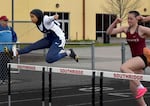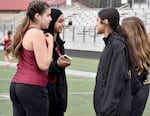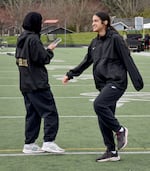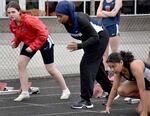On a Wednesday afternoon in March, over 200 athletes gathered at Southridge High School in Beaverton, Oregon, for a track meet. As they stretched and jogged to prepare for their events, their colorful water bottles and energy drinks littered the turf field.

"This year has been different for me," said Filsun Omer, left, of competing in track while fasting for Ramadan. "I've been thinking about the type of meals that I'm eating." Omer, a junior at Westview High School, jumps during the 100-meter hurdle event as part of a March 20, 2024 track meet at Southridge High School in Beaverton, Ore.
Lillian Karabaic / OPB
However, about 10 athletes ran without any hydration boost because they were observing fasting for Ramadan. When the meet began at 4 p.m., those athletes had already been abstaining from food and water for 10 hours and had more than three hours to go.
Millions of observant Muslims over the age of 12 are fasting from sunrise until sunset during the holy month of Ramadan, which ends next week. Some of them are forgoing food and water while doing athletic training.
“Basically, you don’t have the energy that you need because you need to fuel your body with food, obviously. So, it’s very much harder to run while you’re thirsty and hungry,” said Farah Al-Sheikhly, 15, a freshman on the Southridge High School track team.
“I tried doing soccer one year during Ramadan, but it was way too hard for me, so I really didn’t play that season,” said Al-Sheikhly.
This year her fast has been easier. She credited her pre-seasoning training before Ramadan began. Once she’s adjusted to the early wakeups for Suhoor, the pre-fast meal, fasting can actually improve her conditioning. “It helps me gain more stamina,” she said, “Obviously while running and not having the fuel by water or food.”

Southridge High School track team members Claire Smith and Farah Al-Sheikhly, second from left, talk with Jood Aljubouri, second from right, while warming up during the March 20, 2024 track meet. Aljubouri and Al-Sheikhly are both observing the Ramadan fast while participating in athletics.
Lillian Karabaic / OPB
Freshman Jood Aljubouri said that the thirst can be formidable. “I do get dehydrated, but the best thing to do is when I am able to eat, just get as much water as I can and make sure I can balance it out,” she said.
But eventually, said Aljubouri, she adjusts and starts to appreciate the fast. “Once you get to a point, I’d say maybe five days after, it’s like, oh, ‘I like doing this. I realize what this is for,’” she said. “And it just gets better.”

Jood Aljoubouri, right, said the Southridge track team coaches are accommodating to their Muslim athletes. "They make sure that they make announcements that if you're fasting, let a coach know. If you aren't able to do this, let a coach know. If you need any accommodations, let someone know. So they're really nice about it." Aljubouri smiles while warming up with teammate Farah Al-Sheikhly, left, at the March 20, 2024 track meet.
Lillian Karabaic / OPB
Westview High School junior Filsun Omer, who competed in the 100-meter hurdles event, has been running track, among other sports, since the 2nd grade when she lived in Dubai, United Arab Emirates.
Omer said track is one of the better sports to do while fasting because it’s an individual sport.
“No matter what you do, you’re able to still pace yourself, which works out really well for Ramadan,” she said. “We’re able to pace how much we want to push ourselves while still conserving our energy.”
Balancing religious observance and training is a family affair for Omer. Her older brother, Faud Omer, is a freshman on the University of Oregon’s track team. “Our family, we kind of strategize on meal planning ahead of time, ” Omer said. “We make a lot of protein-based meals and think about how much milk and water we’re having.”
But she has another trick to fighting off hunger: “As soon as I come home from practice, I take a long nap after a shower. And so my naps are usually three hours or two hours until it is time to eat.”
While fasting for Ramadan is one of the five pillars of Islam, there are many exceptions — during menstruation, due to health concerns, while pregnant or breastfeeding, or while traveling. Because of the travel exception, many Muslim professional athletes don’t fast when Ramadan falls during competition season.
But Ali CJ Rasoul, a junior at Southridge High School, went to the University of La Verne for college recruit football training camp last week and wanted to maintain his fast. “I got invited to come and be a prospect over there,” said Rasoul. “I did it in Ramadan, so it was really, really hard, but I still managed through it.”

Southridge junior Ali CJ Rasoul, 17, plays varsity football and runs track while observing his fast for Ramadan. While fasting during a recent college football prospect camp he said, "I was taken out because my vision started to get blurry during the Oklahoma drill."
Lillian Karabaic / OPB
On the long trip to California, he ate in the middle of the night to ensure he had enough food and water to sustain himself. However, dehydration still started to affect him during the intense drills.
“I was taken out during the Oklahoma drill because my vision started to get blurry,” said Rasoul. “They took me out, and I went back in. Then we started to compete, and I had to come out every three reps because I would be exhausted, and it was really hot over there.”
Rasoul’s head sprints coach, Lis Vanoudenhaegen, tries to make sure her runners aren’t pushing themselves to the point of exhaustion. “My philosophy is just mostly keeping them healthy,” said Vanoudenhaegen. “If we’re doing something in practice and they’re starting to feel dizzy or something, I’m going to have them take a longer rest than normal just because I don’t want any athlete to pass out during practice. But I also want them to be able to participate to the best of their ability.”
The athletes don’t always listen. “She tells me that if it’s too much, to take a break,” said Rasoul. “And I’m like, ‘No, that’s not happening. I always try to push myself.”
Asha Muse is a Westview junior who ran the 100-meter race while fasting. “After you run a pretty competitive race, you get dizzy,” said Muse. The weather makes a big difference for her. “The other day it was really, really hot, and I just needed water,” said Muse. “I lasted ... but I almost cracked.”
She noted that Ramadan has felt easier this year, maybe because this year the holy month falls mainly in March, so sunset, and therefore food, comes earlier.

Westview junior Asha Muse (center, in blue) gets ready to run the 100-meter event at Southridge High School on March 20, 2024, which falls during Ramadan. She is one of many students on her track team fasting for the holy month while doing athletic training. She also cooks for her large family's Iftar meal, which usually includes chicken sambusa.
Lillian Karabaic / OPB
As the event wears on and the sun gets lower, students start to set up snack picnics on the track, and a few who have finished their events already are sent on missions to bring back takeout.
But the Muslim athletes wait until sunset to have a date and a drink of water to break their fast.
“The best part is when you’re eating that date and water, it’s like, ‘Oh, god, this was so worth it,’” said Rasoul.
After the track meet, many went to prayers and then to Iftar, the post-fast meal with their family or friends. Ramadan is a favorite time of year for these students.
“I love that we have group prayers, it’s just so fun to see everybody,” said Omer. “Iftar is so nice, because it’s kind of Thanksgiving, but every single night, so we get to feast.” The Muslim Students Association even hosts an Iftar event during Ramadan for both Muslim and non-Muslim students.
Al-Sheikhly loves that it is also a family-based holiday. “I like that the family gathers around a lot, and we all do it together,” she said.
Muse enjoys cooking with her sisters for her large family during Ramadan, giving her mom a break, and performing a good deed. “She just relaxes. She cooked for me when I was little, so I want to cook for her now, " said Muse. She often makes sambusa, a traditional Somali chicken-filled pastry during Ramadan.
Observing the Ramadan fast is worth it to these teenagers. Rasoul even thinks it makes him a better athlete. “Oh, heck, yeah. I have noticed that I’ve actually gotten more focused and stronger in my weights and my running,” said Rasoul, “It’s made me a lot better. I don’t know how.”
